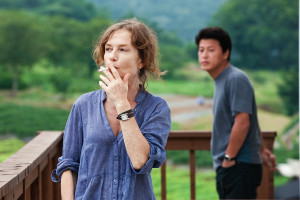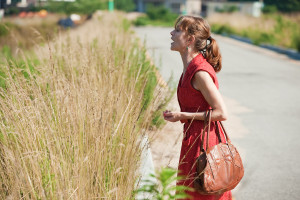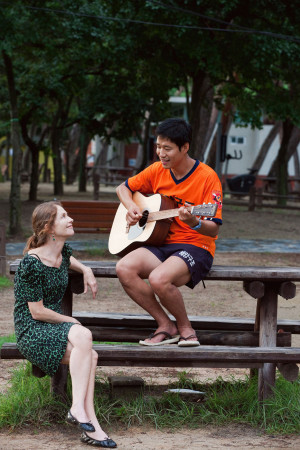In Another Country (2012); English and Korean with English subtitles.
Isabelle Huppert, Yoo Jun-sang, Kwon Hae-hyo, Moon So-ri, and Jung Yoo-mi. Written and directed by Hong Sang-soo.
 A French woman who speaks no Korean. A young woman who manages a bed-and-breakfast. A married couple expecting a first child. A muscular but air-headed lifeguard. A coastal Korean town, some soju, a lighthouse, and the line, “You have to be careful with that kind of Korean man.” These are the ingredients, presented three times, in three separate stories of Hong Sang-soo’s first English-language film, In Another Country, a fun, mostly light-hearted actors’ exploration of setting, character, and language.
A French woman who speaks no Korean. A young woman who manages a bed-and-breakfast. A married couple expecting a first child. A muscular but air-headed lifeguard. A coastal Korean town, some soju, a lighthouse, and the line, “You have to be careful with that kind of Korean man.” These are the ingredients, presented three times, in three separate stories of Hong Sang-soo’s first English-language film, In Another Country, a fun, mostly light-hearted actors’ exploration of setting, character, and language.
Isabelle Huppert stars as three different women named Anne: first a famous French film director, then a woman seeking time with a man who is not her husband, and finally a divorcee whose husband has left her for a young Korean secretary. In each story, set in the same town with roughly the same supporting actors, the French visitor has a different reason for visiting, and the surrounding characters provide different responses to her presence. Not exactly a character study, the film feels more like the result of an improvisation workshop where actors are given a rough skeleton of a plot and multiple chances to play it out, turning the best stuff into a movie script.
 Unlike most films I’ve seen with similar structure, In Another Country is consistently interesting and engaging. Anne’s effort to express herself in the English that most of the other characters have only a basic grasp of feels genuine, and while a spirit of goodwill permeates most of the film’s mood, there are underlying currents of suspicion and mistrust, in doses small enough not to veer off into intrigue but present enough to give certain scenes a healthy tension.
Unlike most films I’ve seen with similar structure, In Another Country is consistently interesting and engaging. Anne’s effort to express herself in the English that most of the other characters have only a basic grasp of feels genuine, and while a spirit of goodwill permeates most of the film’s mood, there are underlying currents of suspicion and mistrust, in doses small enough not to veer off into intrigue but present enough to give certain scenes a healthy tension.
There is a strong mumblecore sensibility to Hong’s approach. A musical score is used extremely sparingly, and only as a transition from one scene to another. Dialogue is sometimes drowned out by ambient noises, such as the sounds of footsteps crunching on gravel, or a sudden gust of wind making that blowing sound we always hear in film clips shot with our smartphones or camcorders. The use of the ambient sound as part of the film, and not something to be mixed down or processed out, is one of my favorite things about this movie; I love the way it creates the voyeuristic illusion of detachment and intimacy with these interesting characters. Camera movement is mostly unremarkable, but there are a few scenes where jerky zoom-ins create the effect of our spying on these characters’ conversations.
 One film-making decision I disagree with is the sequencing of the three stories. I don’t want to spoil anything, but the third Anne character is perhaps not quite as likable as the first two, and since she is the main character, it seems weird not to let us leave her in her most positive light, unless the film is trying to make a less-than-admiring statement about European women in Korea. If this is the case, it’s an even worse decision because the rest of the script does little to support such a thesis.
One film-making decision I disagree with is the sequencing of the three stories. I don’t want to spoil anything, but the third Anne character is perhaps not quite as likable as the first two, and since she is the main character, it seems weird not to let us leave her in her most positive light, unless the film is trying to make a less-than-admiring statement about European women in Korea. If this is the case, it’s an even worse decision because the rest of the script does little to support such a thesis.
The film really succeeds on Huppert’s gentle, graceful performance. Even in scenes where she tries awkwardly to help someone understand what she means by “lighthouse,” there is a pleasant lack of urgency in her delivery, and her confident acting serves the other actors well as they revolve around her and respond to her. At her most appealing, she is a glowing, laughing presence among friends, believably magnetic among others, and someone impossible to look away from in a most enjoyable movie.
8/10
In Another Country opened Friday, January 25 at Landmark’s Opera Plaza Cinemas in San Francisco.








